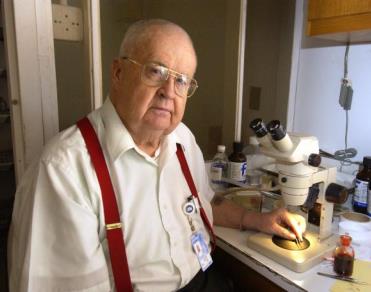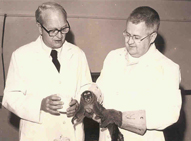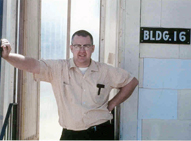Thank you to John Barnwell, Beatie Divine, Laurence Slutsker, Rick Steketee and Pete Zimmerman for contributing information.
The Society mourns the loss of Bill Collins, a beloved ASTMH member since 1961 who previously served as an editor of the ASTMH newsletter. Collins retired from the CDC this past July where he studied malaria for more than two-thirds of his life.
 After finishing his PhD in entomology from Rutgers University in 1954, he was drafted into the US Army and spent two years at the US Army Biological Warfare laboratories at Fort Detrick. While stationed there, he met Janet Johnson, and they were married in July of 1956. He later joined the National Institute of Allergy and Infectious Diseases (NIAID) in Columbia, SC. Reflecting on that early part of his career, Collins once said, "I received a phone call (out of the blue) from NIH offering me a job at NIH that I took unseen. I have been with the USPHS ever since. So I have a continuous line of government service since October 1, 1954, and a continuous line with the USPHS since 1959.”
After finishing his PhD in entomology from Rutgers University in 1954, he was drafted into the US Army and spent two years at the US Army Biological Warfare laboratories at Fort Detrick. While stationed there, he met Janet Johnson, and they were married in July of 1956. He later joined the National Institute of Allergy and Infectious Diseases (NIAID) in Columbia, SC. Reflecting on that early part of his career, Collins once said, "I received a phone call (out of the blue) from NIH offering me a job at NIH that I took unseen. I have been with the USPHS ever since. So I have a continuous line of government service since October 1, 1954, and a continuous line with the USPHS since 1959.”
 In 1973, the CDC hired Collins as part of a major research program developed to study human and monkey malaria parasites. Collins then became part of the new malaria branch at CDC, where he spent the next four decades working with malaria, mosquitoes, and monkeys. Collins called his work "an ongoing discovery." His respect and awe for the organism he studied was apparent. He called their structure "beautiful." Collins did research with many species of malaria parasites, particularly Plasmodium falciparum, P. vivax, and P. simium. "We learn from all the parasites," he said. The scientific community recognized Collins' intensive work in this field naming a subspecies for him, Plasmodium vivax collinsi. He also has a new species of a great ape malaria parasite named after him, Plasmodium billcollinsi.
In 1973, the CDC hired Collins as part of a major research program developed to study human and monkey malaria parasites. Collins then became part of the new malaria branch at CDC, where he spent the next four decades working with malaria, mosquitoes, and monkeys. Collins called his work "an ongoing discovery." His respect and awe for the organism he studied was apparent. He called their structure "beautiful." Collins did research with many species of malaria parasites, particularly Plasmodium falciparum, P. vivax, and P. simium. "We learn from all the parasites," he said. The scientific community recognized Collins' intensive work in this field naming a subspecies for him, Plasmodium vivax collinsi. He also has a new species of a great ape malaria parasite named after him, Plasmodium billcollinsi.
Throughout the years, Collins stacked up plenty of memories and milestones. He authored more than 450 scientific publications. In addition, his work achievements were recognized through multiple prestigious awards, including the Joseph Augustin LePrince Medal from the ASTMH (1985), the William C. Watson, Jr. Medal of Excellence from CDC (2001), and the Society's Harry Hoogstraal Medal (2009), which recognizes lifelong service to medical entomology. He was awarded in 2012 the HENRIQUE ARAGÃO Medal at the XVIII International Congress of Tropical Medicine and Malaria.
Of his late colleague, ASTMH member Larry Slutsker, MD, MPH, director, Division of Parasitic Diseases and Malaria, CDC, said, "Bill Collins is a consummate scientist, and his career has been an inspiration to those working in malaria. His decades-long joy in and commitment to his work, marked by extraordinary enthusiasm, curiosity, and scientific rigor, have brought him richly deserved international recognition as one of the world’s leading malaria parasite biologists. His excellence has been matched with rare humility and a consistent desire to share his science with others to achieve his overriding goal—an end to malaria."
 Former ASTMH Councilor Richard W. Steketee MD, MPH, FASTMH, science director, Malaria Control Program and MACEPA, PATH, said Collins was a "legendary malaria parasite biologist and entomologist" who taught many US-based malaria researchers "pretty much everything we know about the malaria parasite." According to Steketee, Collins' study of malaria has been "nothing short of remarkable," noting his involvement in the trials of malaria infections as treatment for neurosyphilis to developing the non-human primate models for malaria vaccine studies.
Former ASTMH Councilor Richard W. Steketee MD, MPH, FASTMH, science director, Malaria Control Program and MACEPA, PATH, said Collins was a "legendary malaria parasite biologist and entomologist" who taught many US-based malaria researchers "pretty much everything we know about the malaria parasite." According to Steketee, Collins' study of malaria has been "nothing short of remarkable," noting his involvement in the trials of malaria infections as treatment for neurosyphilis to developing the non-human primate models for malaria vaccine studies.
Despite his outsized contributions to the field, Collins said co-workers and friends helped him derive some of the greatest meaning in his work. Reflecting on his career, Collins once said, "The most memorable event was when I completed my 50 years with the government and audio-visual people made a video of my accomplishments. However, the most important and favorite memories are of coworkers and friends. I looked upon all of them as family, and anyone who has seen my office knows that my office wall is covered with collages of pictures of these current and former coworkers. I miss them all."
Collins is survived by his wife Janet, his daughter Sheila, son Bill, daughter-in-law Erin, and grandchildren Mackenzie and Chloe.
Photos from top right: Bill Collins in his signature red suspenders; Dr. McWilson Warren (left, world recognized expert on malaria, both of humans and of monkeys) Bill Collins (right); A younger Collins at one of the old Chamblee buildings, Building 16.